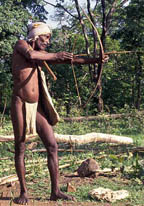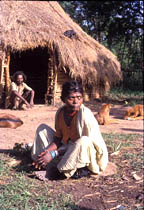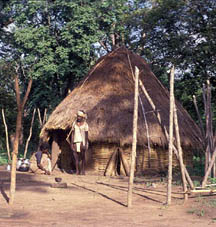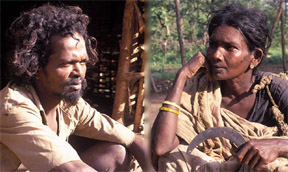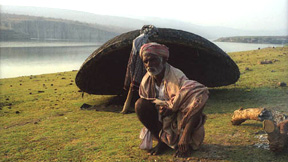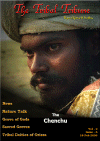The Chenchu of Andhra Pradesh
The Nallamalai forests are deciduous and deep. They cover mountainside, and are full of treacherous pathways and dangerous ridges. The Chenchus are undaunted by their natural surroundings and set out to gather food or hunt animals. The bow and arrow and a small knife is all the Chenchus possess to hunt and live. They hunt wild animals like boar and deer, but with the increasing interest in wild life conservation, they are content to hunt small animals like lizards, rabbits and wild birds. Their meal is fairly simple and usually consists of gruel made from jowar or maize, and boiled or cooked jungle tubers. They mix tamarind fruit with tamarind ash and eat. This is especially good for pregnant women. They normally eat before setting out to gather food in the morning and eat again when they return home in the evening. This speaks of the enormous stamina of the Chenchus who trek on foot through jungle paths all day long. The slender build of their bodies is deceptive and express little of their strong and resilient nature.
Centuries of life in the forest have deprived the Chenchus of an ability to adapt easily to external situations. Though some of their children are sent to government schools, there are very few instances of educated Chenchus finding their way into mainstream modern society. The Chenchus are struggling to adapt to new patterns of life as the forest resources dwindle with time. The Chenchus have been their own masters for many generations and have not needed the services of any outsider. They are unmindful of an external society, which is alien and unimportant to them. The life in the wild is one of hardship, but the Chenchus live on cheerfully unmindful of their difficulties. The boundaries of their native perception are defined by the natural boundaries of their geography. The roots are strong and the bonding to an age-old tradition is deep and abiding. The Chenchus continue to live contently in their ancestral homeland as true sons and daughters of the forest to celebrate the joys and gains of life.
"Peddamanishi" or the village elder is generally the authority to maintain social harmony in a family or a village. Generally, his counsel and word are final in all matters of the village. The Chenchu society is divided into 26 exogamous clans (like Hindu gotra) or descendant groups. Each clan has identifying name by which the members trace their common ancestry. Same clan marriage is prohibited. A woman is incorporated into the clan of her husband. The marriage is known as "Pelli", and takes place through a negotiated arrangement involving elders or through the choice of the young couple concerned. The ceremony is performed with traditional rituals in front of the community and the village elders.
The elders belonging to the "Uttaluri" clan must be present as a matter of traditional custom as the priest or "Kularaju" officiates over the marriage rites. The maternal uncle of the bride gives the bride away, and there is a feast and celebration at the end of the ceremony. The newly married Chenchu couple set-up their own house. Divorce is allowed when the society elders are convinced. Widow remarriages is common among them. The Chenchus have a strong belief system. They worship their deities with great devotion. Lord Eshwara among them is known as "Lingamayya", and Shakti as "Maisamma" or "Peddamma". The worship of both male and female deities is accompanied by puja during the month of "Sravan", that is from July to August. The ritual of Lord Lingamayya represents the ancient mode of worshipping Lord Shiva. For ages, the Chenchus have been associated with the famous Srisailam temple in Andhra Pradesh situated at the heart of Chenchu land. The Srisailam temple dedicated to Lord Shiva and Devi Brahmaramba is a sacred pilgrim centre for Hindus of all sects. The legend goes that Lord Mallikarjuna, an incarnation of Lord Shiva fell in love with a young Chenchu maiden "Chenchu Laxmi" and married her. The Chenchus believe that they are the descendents of this couple and have a special place and mention in Puranas, temple records and Chronicles. The Chenchus enjoy special privileges at Srisailam temple.
The Chenchus love their gods dearly and pray to them in earnest and endearing terms. The devotion borders on frenzy and passion and is magical in effect on the surroundings. The celebrations can be austere, serene and simple and sometimes they can be wild, intoxicating and mystical. The rich folklore of their forefathers inspires and guides them to maintain a solid tradition. The dance, the gaiety, and the lyricism of their life reflect the joy and innocence as they live a life of rich contentment, seeking and aspiring for very little. |
Photographs: By the Author including that on Cover
Illustrations:
References:

